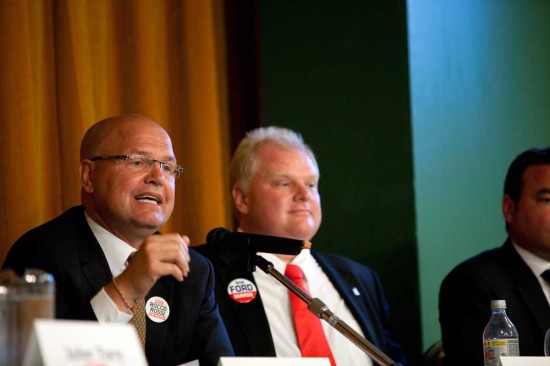TORONTO––Ontario’s 72,000 elementary public school teachers were logging online to vote beginning this past Sunday on a province-wide plan to implement one-day rolling strikes in an effort to pressure the provincial government to repeal Bill 115, the controversial Putting Students First Act passed by the legislature on September 11. The act, which effectively freezes teachers’ salaries at August 30 levels for two years, strips out a number of financial benefits, particularly for teachers with under 10 years tenure, and empowers the province’s education minister to outlaw job action by unions or lockouts by school boards, has met with strong opposition from teachers and their unions, with strike mandate voted for in the high nineties occurring at both the elementary and secondary levels. Voting was to continue until midnight on Monday, with the results to be released yesterday (Tuesday), but the results of previous votes make it all but a given that the motion will pass handily.
The battle lines continue to harden in the labour dispute, with the unions taking the province to court over an infringement on their basic human rights by being unilaterally stripped of their right to collective bargaining. The province maintains that in a time of severe fiscal deficits, they had no choice but to take measures to prevent disruption of classes.
“We passed the Putting Students First Act to allow us to continue the progress we’ve made in our schools, to protect full-day kindergarten, to keep class sizes small and to preserve 10,000 teacher jobs,” Education Minister Laurel Broten stated in a press release. “We also needed the act to give us tools to keep students in the classroom.”
The union sees things differently.
“It is unfortunate that we have been placed in the position of having to strike by Education Minister Laurel Broten, but we will provide parents with ample notice to ensure the safety of students,” said ETFO President Sam Hammond in a statement released November 28. “By her actions, the minister has let everyone down by stripping teachers and education professionals of their democratic rights, and shutting down recent talks at the provincial level.”
Elementary school teachers have largely withdrawn from extracurricular activities at their schools as a political protest since shortly after the passage of Bill 115. Rainbow District School Board Elementary Teachers Federation of Ontario (ETFO) local President Barb Blasutti noted that the withdrawals of voluntary services were specifically not job actions, but rather political protests. Until the delivery of a no-board report by a conciliator, and a cooling off period, the union was not in a position to take job action, but that deadline will be met on December 10.
Ms. Blasutti would not say what specific job actions the union would take if union members delivered a mandate on Monday’s voting. “I really can’t comment on that until Tuesday,” she said. She did confirm that the union would provide three-day notice of any withdrawal of service, referencing the need to ensure student safety.
Rainbow District School Board Education Director Norm Blaseg noted the advance notice was critical to the board and parents to prepare for the event.
“If we’re going to close schools, parents always need that extra time in order to get arrangements made for their children,” Mr. Blaseg said. “We wouldn’t be able to provide those services (keeping schools open and supervising children) for parents.”
The Ontario government, for its part, has also been holding its cards close to its chest, but the big stick is very much in plain view. While the government has given itself the power to impose limits on teacher’s strike actions during this labour dispute, the minister is unwilling to say exactly which actions the government will outlaw or when. “Our preference has always been to continue to negotiate until we reach agreements,” said Minister Broten. “But we do have tools in the act to either impose an agreement, which would mean no strikes or lockouts for the duration of the agreement, consistent with previous agreements.”
Even as the voting was taking place, the ETFO was not characterizing the one-day rotating walkouts as “strike action” but rather labeling the withdrawal of services as “a day of protest.” The resulting ‘day of protest’ would nonetheless shut down schools for a day, and so the distinction is being treated as largely a semantic by the province, and the minister has clearly indicated that she will move to outlaw the practice.
Timing of the protests is expected to be staggered across school boards and will likely take place between December 10 and December 21. Island schools could be shut down for a day anytime within that period. The ETFO has assured parents that 72 hours notice would be provided before any shutdown would occur. If that notice is delivered following tabulation of the vote, a teachers walkout at Island schools could occur as early as December 10.
“Disrupting learning time for students is not in the best interest of students,” Minister Broten said in a statement. “I will monitor strike actions very closely. The government does have tools to address these actions, and we will explore those options if required.”
It remains unclear if the minister could shut down the job action/political protest quickly enough to prevent the one-day disruption and parents are scrambling to make arrangements to provide childcare for their children in the event of a closure.
Voting on the protest actions by ETFO members was reported to be heavy, at one point overwhelming the union’s 20 help desk telephone lines and causing the phone lines to collapse, according to a Sunday afternoon union Twitter account text. On Monday morning of this week the union’s website indicated that, although the call centre lines had been jammed for about two hours Sunday afternoon, everything was now back to normal and the vote was proceeding smoothly.
Bill 115 provides the legislative authority to impose restrictions on labour dispute actions in the elementary and secondary school education sector, but it also references a memorandum of understanding (MOU) process.
The MOU provides for, among other things, salary increases of 0 percent in 2012 and 2013, three unpaid professional administration (PA) days in 2013-14 (1.5 percent of salary), a delay of 97 days for increments, a reduction of annual sick days from 20 to 10 with no accumulation from one year to the next, the freezing of retirement gratuities, and the abolition of the retirement gratuity for any member hired after September 1, 2012. The retirement gratuity was based on an accumulation, unused sick days and was payable as a bonus upon retirement._
The MOU also has provisions that address the hiring of occasional teachers to long-term positions, the hiring of occasional teachers into regular teacher positions, and the recognition of the professionalism of teachers in doing diagnostic assessments.
However, the government has stated its intention, as part of the deal struck with the Official Opposition Progressive Conservatives that these provisions will not apply to agreements reached after September 1. Regulations have been enacted to address hiring of long-term occasional and permanent teachers, generally conforming to the MOU and which apply to virtually all school boards. There are no regulations, as yet, on diagnostic assessments.
Any contract agreement between a union local and a school board must be submitted to the minister of education to be vetted against the MOU provisions. As of Monday, there have been a number of collective bargaining agreements negotiated in the province, and Minister Broten had approved collective bargaining agreements at the York and Niagara region school boards, but the union locals did not ratify those agreements.
The changes to sick leave are significant under the MOU. The MOU mandates the reduction of the number of days that teachers can access for sick leave from 20 to 10 days per year. The MOU also prohibits the carry-over or accumulation of any of these days for future use. If a teacher is sick for a period beyond the 10 days the teacher may access up to 120 additional short-term sick leave days to be paid at two thirds or 90 percent of salary depending on the circumstances. Boards are required to develop and implement a short-term disability plan through a third party provider.
On August 30, the ETFO joined the Ontario Secondary School Teachers’ Federation (OSSTF), the Canadian Union of Public Employees (CUPE Ontario) and the Canadian Civil Liberties Association (CCLA) in announcing that they would challenge the bill in court.
It is expected that other unions will support the legal challenge and the CCLA has characterized Bill 115 as “an unprecedented attack on the civil liberties and constitutional rights of educational workers.”
Daycare services provided at elementary school locations are unlikely to be directly impacted by the strike because different unions represent them.





